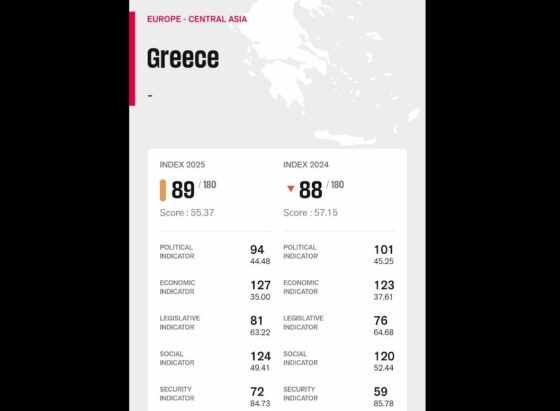Reporters Without Borders: Greece Ranks Last In The Eu For Press Freedom Yet Again In 2025

Greece continues to hold the lowest position among EU countries for press freedom, according to the 2025 rankings released by Reporters Without Borders (RSF). On a global scale, Greece also dropped a spot, slipping from 88th to 89th place.
The rankings, covering 180 countries, were published on Friday ahead of World Press Freedom Day, marked annually on 3 May.
“Press freedom has suffered a systemic crisis since 2021. The scandal of the wiretapping of journalists by the National Intelligence Service (EYP) has yet to be cleared up, as is the case regarding the murder of veteran crime reporter Giorgos Karaivaz in 2021. SLAPP procedures are common.”
“Media landscape
The population’s trust in the media has been one of the lowest in Europe for many years. A few large privately owned groups like Alter Ego Media coexist alongside hundreds of news sites, which contributes to a high fragmentation of the media landscape. Similarly, a few entrepreneurs run the vast majority of media outlets, while being involved in other highly regulated business sectors. Some of them have close ties to the country’s political elite. As a result, the press is very polarised.
Political context
Despite constitutional guarantees, press freedom has been challenged at the legislative level. New laws passed by Parliament in response to the Predatorgate wiretapping scandal are meant to better protect citizens against arbitrary surveillance but fall short of European standards, and the Supreme Court cleared the National Intelligence Service (EYP) of its involvement in the scandal. A media bill has led to the creation of a controversial ethics committee and a journalist was convicted under the criminal code of spreading false information without any hard evidence. An amendment passed in 2023 increases the risk of journalists being jailed for defamation.
Economic context
The financial crisis of the last decade, combined with declining readership and advertising budgets, has called into question the long-term survival of many media outlets. The impact of the new legislation aimed at increasing transparency of media ownership and funding remains to be seen.
Sociocultural context
The premises of some media outlets are regularly attacked by far-left and far-right activists who see them as ideological enemies. In addition, female journalists frequently face sexism in the workplace.
Safety
The police regularly resort to violence and arbitrary bans to obstruct journalistic coverage of demonstrations and the refugee crisis on the Greek islands. Journalists have been the victims of physical attacks during sporting events and in front of their homes. The murder of veteran crime reporter Giorgos Karaivaz, who was gunned down in broad daylight in front of his Athens home in 2021, has yet to be resolved, two suspects having been acquitted in 2024. The limited scope of a working group on the protection of journalists is preventing it from addressing Greek journalism’s systemic crisis.”
______________________________________________
Are you seeking news from Greece presented from a progressive, non-mainstream perspective? Subscribe monthly or annually to support TPP International in delivering independent reporting in English. Don’t let Greek progressive voices fade.
Make sure to reference “TPP International” and your order number as the reason for payment.


